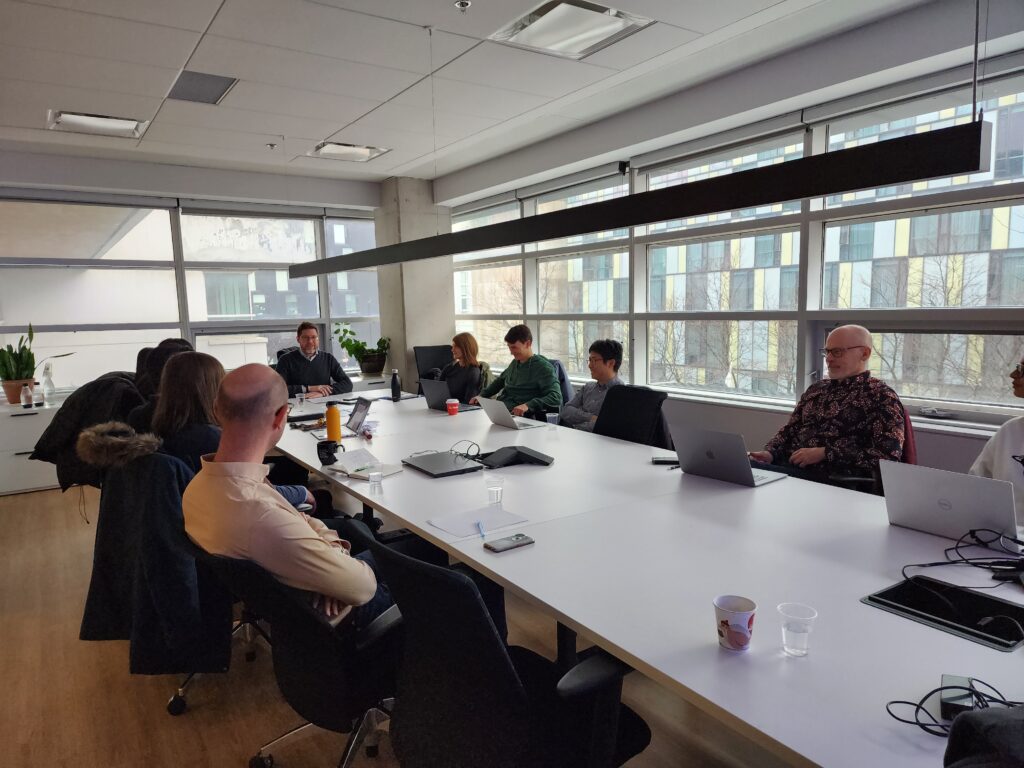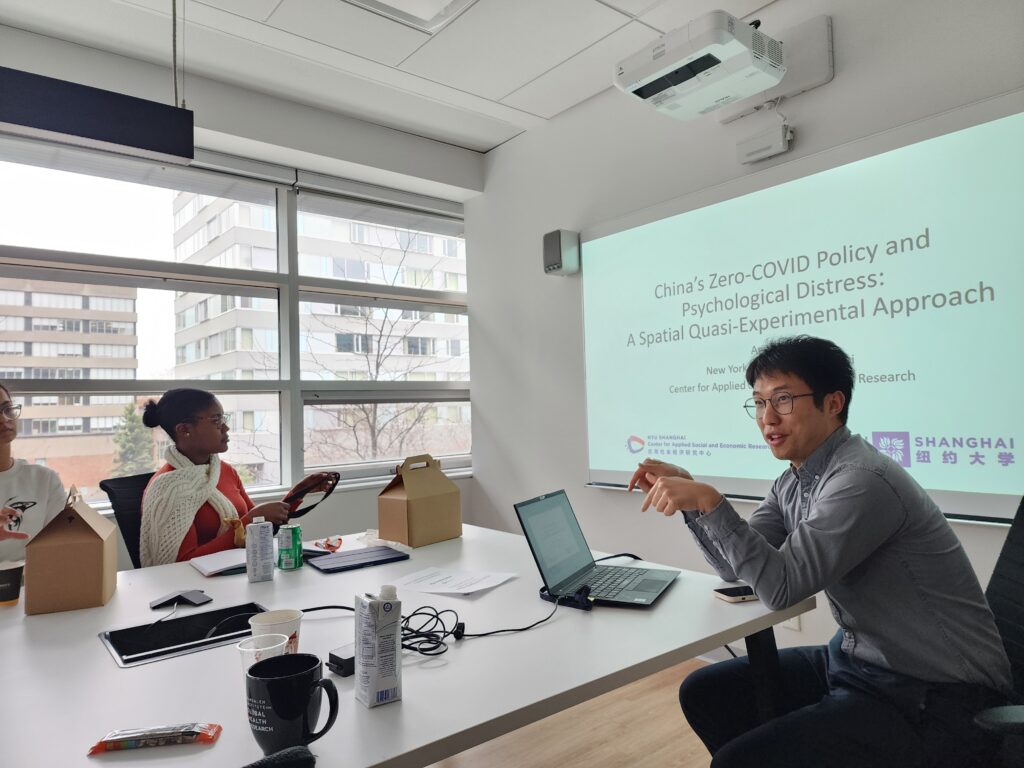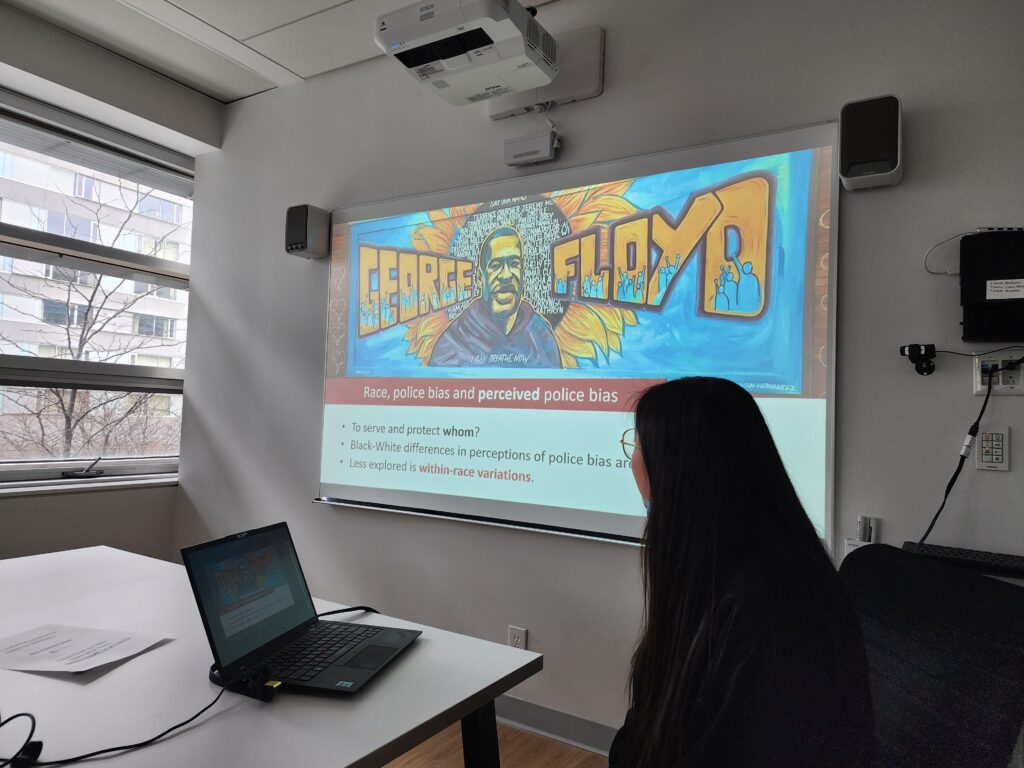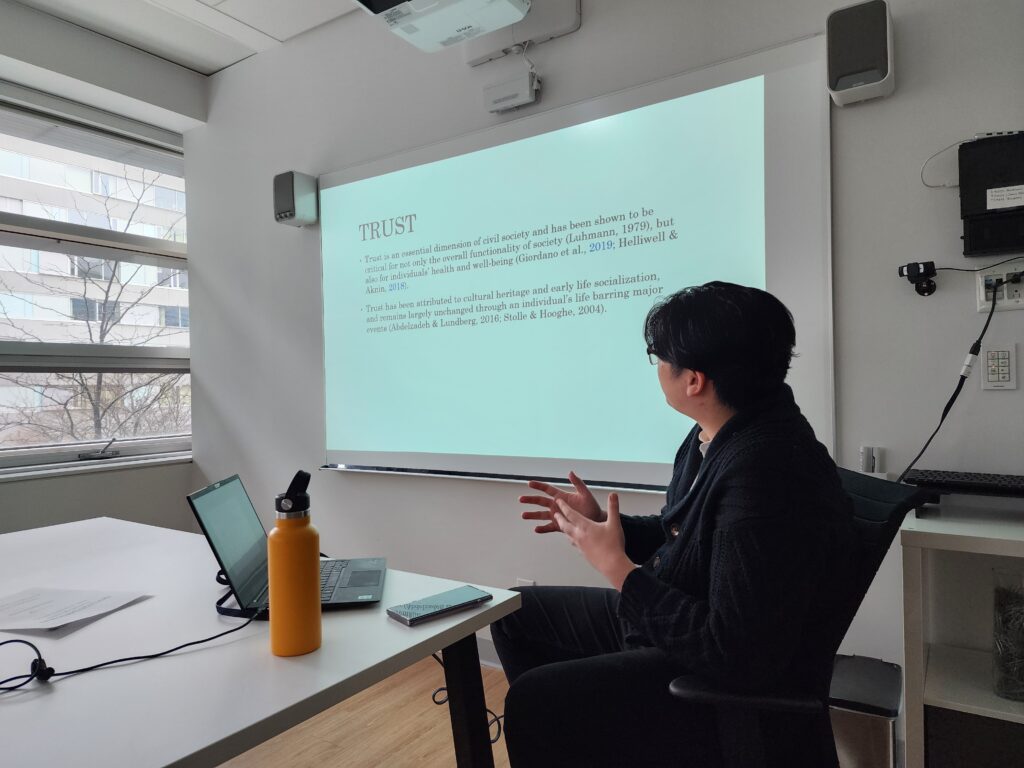Post
Published on April 12, 2024
The "Trust and Political Sociology of Health" research workshop took place on April 4th at the Dahdaleh Institute for Global Health Research, York University. This forum brought together senior and emerging scholars, practitioners, and students sharing a common interest in democracy, governance, and trust within the realm of health and well-being.
The workshop, led by Professor Cary Wu York Research Chair in the Political Sociology of Health and Dahdaleh Institute faculty fellow, featured three discrete sessions. During one session, select workshop participants presented their research-projects-in-progress on various topics in trust and the political sociology of health to elicit actionable feedback from other workshop participants. During another session, two invited participants, both leading researchers, presented their completed research projects. The substantive goal of these two sessions was to bring together budding and leading researchers of trust to begin the launch of a community of peers interested in topics in the political sociology of health.
During the other session, Dan Harper, the Strategic Initiatives Lead of the Rural Coordination Centre of British Columbia (RCCbc) gave a short talk on his organization and their mission to advance rural health equity. What follows is a closer take of each part of the day.
Opening Remarks
The “Trust and Political Sociology of Health'' workshop began with a welcome from Professor Mark Thomas, professor and Chair in the Department of Sociology at York University. Prof. Thomas introduced Prof. Wu, highlighting Prof. Wu’s vibrant contributions to not only the teaching and research excellence of the Department but to public sociology more broadly, noting Prof. Wu’s work in communicating the sociology of trust, racism, health, and migration to multiple publics. Prof. Thomas also celebrated Prof. Wu’s appointment as a York Research Chair in the Political Sociology of Health, highlighting Prof. Wu’s research program which proposes the analytical utility of trust to obtain a transdisciplinary political sociology of health.
Following Prof. Thomas’ welcome message, Theresa Dinh, Coordinator of the Dahdaleh Institute for Global Health Research, introduced the Dahdaleh Institute, highlighting its mandate to create knowledge that addresses global health challenges. Theresa stressed the Institute’s commitment to gathering scholars from a range of disciplinary traditions, as a university-wide organized research unit, and the Institute’s work, at the intersection of research, policy, and practice, in planetary health, global health and humanitarianism and global health foresighting.
Finally, Prof. Wu welcomed participants, explaining his vision to develop a transdisciplinary political sociology of health framework with the concept of trust and the importance of training the next generation of scholars on trust and the political sociology of health. Prof. Wu introduced the aims of the workshop, to offer advice on research in trust and the political sociology of health at all stages of development, from devising research outlines to preliminary data analyses to producing written texts and to foster conversations at the cutting edge of research in trust and the political sociology of health.

Session 1: Research projects
Opening the first session was Prof. Eric Mykhalovskiy, Dahdaleh faculty fellow and professor in the Department of Sociology at York University. A well-established scholar, Prof. Mykhalovskiy has made a profound scientific impact with his scholarship on HIV/AIDS and his many contributions to the sociology of health and healthcare. Prof. Mykhalovskiy spoke about forging a newfound research interest in trust and urban noise. He discussed his preliminary research outline which suggested that a definitional equation of noise to aural phenomenon should be avoided. Prof. Mykhalovskiy critiqued this understanding of noise, sharing a snippet of his preliminary qualitative data which showed how urban noise is rendered by residents in downtown Toronto neighbourhoods. Of important consideration was residents’ moral and political imagination when experiencing urban noise. Prof. Mykhalovskiy found that social trust, the belief that most people can be trusted and trust in institutions, specifically in 311, the institution Toronto residents call upon to report problems such as noise complaints, greatly underlie peoples’ experience of noise. What followed was a vibrant discussion of participants’ personal experiences of urban noise and the opportunity to think through potential theoretical and methodological issues in his research.
Second in the lineup of presenters was Prof Ingrid Pechenkov, who has just received her PhD from the Department of Psychology at York University and is now teaching at Trent University. Prof. Pechenkov presented her ongoing research project which considered the role of gender as a determinant of mental health. She discussed the debated role of gender in mental health and shortcomings in the empirical literature, namely, issues in the measurement of gender and the absence of diverse samples. Prof. Pechenkov discussed her interest in testing the competing hypotheses: the androgyny hypothesis which relates androgyny to higher psychological well-being and the person-environment fit hypothesis which suggests that environment fit in femininity or environment fit in masculinity affect psychological well-being. She noted that her research conceptualizes gender on a continuum to better understand mental health outcomes across genders. Participants offered constructive feedback regarding Prof. Pechenkov’s analytic plans, noting the opportunity to investigate the possibility of a bidirectional association.
Third to present was Rex Wang, a doctoral candidate in the Department of Sociology at York University. Rex presented his research outline, preliminary data, and analytic plan for his exploration of the Canadian Trust Radius which refers to whether Canadians think “most people” can be trusted and to whom “most people” refers. In his research project, Rex grapples with methodological concerns related to how Canadians interpret “most people” across cultures and contexts, for instance, whether “most people” encompasses strangers as well as the determinants of trust radius. This sparked discussion among participants.
Fourth to present was Joanne Ong, an incoming PhD Student in the Department of Global Health at York University. Joanne presented findings from a paper co-authored with Prof. Wu and Jenny Nilsson, an MA graduate from the Department of Sociology at York University. Joanne discussed the role of political ideology in Black-White differences in perceptions of police bias as well as within-White population differences and within-Black population differences. Further, she discussed their key finding that the link between perceived police bias and poor mental health is primarily driven by ideological differences among White Americans, but not among Black Americans. Her research prompted conversation on the importance of investigating within racial group variation in perceptions of police bias and the racially specific mechanisms driving the mental health consequences of perceived police bias.
Concluding the first part of the workshop, Simarpreet Kaur, a BA Honours Student in Psychology and Criminology and Emmanuella Binanga, a BA Honours Student in Sociology discussed their respective Dean's Award for Research Excellence (DARE) projects in Trust and Sleep and Democracy and Health. They shared their research plan and their enthusiasm about working with Prof. Wu as DARE Awardees.
Session 2: Knowledge mobilization with RBBC
This second session of the workshop discussed academic innovation through community engaged research. Dan Harper posited the possibility of co-developing a research program with RCCbc to address Indigenous health gaps. He discussed the rural healthcare challenges encountered by BC Indigenous groups and the critical need for researchers to provide their methodological skills to further understanding of how trust shapes Indigenous health gaps which are influenced by local-area deprivation and forces such as systemic racism and colonialism and to support the co-design and co-delivery of culturally safe health initiatives that benefit Indigenous health.
Session 3: Developed/published papers
For the final session of the workshop, two established researchers were invited to present their published work on political trust and health.
First to speak was Prof. Angran Li, assistant professor of Sociology at NYU Shanghai. He presented his publication, “China’s zero-COVID policy and psychological distress: a spatial quasi-experimental design” which considered the impacts of stringent lockdown interventions on Chinese urban residents’ mental health during the early Omicron outbreaks as well as other lockdown-related stressors, namely a lack of material supplies and medical care, social interaction, which is a representative form of social capital, and political trust, which refers to trust in governments. Presenting the findings from his spatial quasi-experimental design, Prof. Li showed that strict lockdown interventions strongly and negatively impacted psychological well-being after controls. Second, Prof. Li showed that shortages of material supplies and a lack of medical care significantly explained the variation in psychological distress rather than social capital and political trust. His presentation was followed by a conversation on his methodology and why social capital was not significantly related to mental health in his research, a finding Prof. Li noted to be against Prof. Wu’s own published findings associating social capital to mental health during COVID. Prof. Li responded by describing methodological issues he encountered in his research.
Last to present was Prof. Andrew Dawson, an associate professor in the Department of Sociology at the Glendon Campus of York University. Prof. Dawson discussed the outcomes of his multilevel analysis of a panel dataset that included individual-level and country-level observations of 82 countries for the period 1990–2020. First, he discussed a strong, negative relationship between democracy and political trust that holds after controlling for various country-level and individual-level factors. Second, Prof. Dawson shared his test of a two-dimensional conceptualization of political trust in terms of trust in partisan political institutions and trust in less partisan political institutions and his finding of lower levels of political trust across both categories of political institutions. Participants appraised his research findings and what sparked particular interest was one of the covariates Prof. Dawson presented, corruption, because it had a positive significant effect on trust in partisan political institutions and a nearly identical negative effect on trust in non-partisan institutions.

Concluding Remarks
The workshop concluded with Prof. Wu and participants expressing their thanks and hope that this workshop would be the first among many. The consensus was that the workshop was a lively forum to obtain advice on the cognitively demanding aspects of academic work as well as the emotionally demanding aspects and to interact with established researchers.
The workshop closed with Prof. Wu acknowledging the funding support from the Social Sciences and Humanities Research Council of Canada, the Canadian Institutes of Health Research, and the York University Research Chair program.
Themes | Global Health & Humanitarianism, Global Health Foresighting |
Status | Active |
Related Work |
N/A
|
Updates |
N/A
|
People |
Eric Mykhalovskiy, Faculty Fellow, Faculty of Liberal Arts & Professional Studies - Active
Cary Wu, Faculty Fellow, Faculty of Liberal Arts & Professional Studies - Active |
You may also be interested in...
Upcoming Webinar Series on Climate Change and Global Occupational Health and Safety
The Dahdaleh Institute for Global Health Research, Global Labour Research Centre, and ReSTORE (University of Toronto) are proud to cosponsor CIFAL York's new Climate Change and Global Occupational Health and Safety speaker series. Climate change ...Read more about this Post
Recap – Gender as a Dimension of Inclusive Innovation
On April 24, 2024, Dahdaleh adjunct faculty fellow Dr. Jean-Jacques Rousseau and development practitioner Devina Srivastava (Global Fellow, Center for Human Rights and Humanitarian Studies, Brown University) discussed the importance of inclusive innovation as an ...Read more about this Post
Pandemic Prevention and Global Policy in Geneva
In late May, Dahdaleh faculty fellow Tarra Penney and Dahdaleh research fellow Chloe Clifford Astbury travelled to Geneva to attend the Geneva Health Forum and Geneva Health Week, which ran in parallel with the 77th ...Read more about this Post


